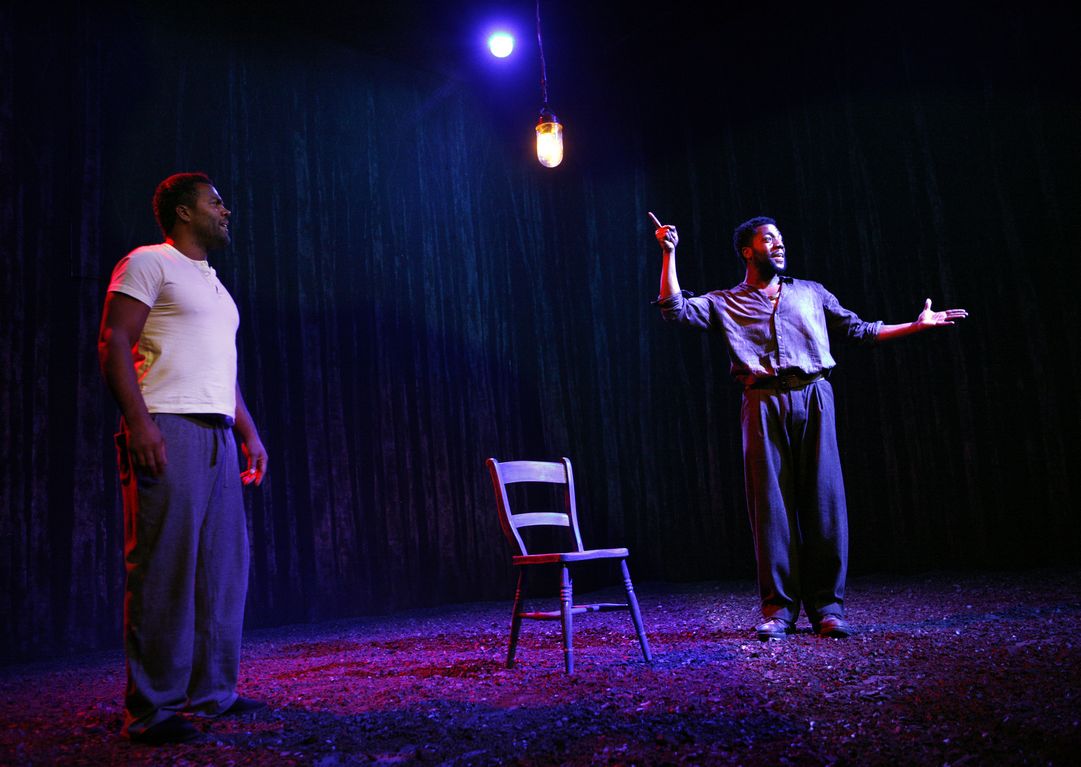
October 1995: the ‘Million-Man March’ takes place in Washington DC to protest levels of black unemployment and a reduction in educational funding for the poorest districts of the country. It is a black-only, man-only protest. But one African-American maths professor, Lewis, has decided he is not taking part. For this, and as we learn, other domestic shortcomings, his white wife announces she wants a divorce. The shock forces him to re-examine his sense of identity and how much he has suppressed his cultural legacy in his bid to become ‘invisible’ in a white middle class man’s world.
Plunged into a long sleepless night of self-reflection, Lewis (Ray Fearon) is ‘visited’ by three generations of male forebears, all played by Fehinti Balogun, each bearing harrowing chapters from a story that climbs from the privations of slavery and a harrowing lynching to drunkenness and early death from drug overdose. Lewis, finally, is forced into a reawakening and an ownership of his past. The title, Blue Door, is taken from Lewis’s great-great-grandmother’s belief that if you painted your door frame blue you would ward off evil spirits. The spirits wafting through Lewis’s mind were not evil, but livid incarnations, the irrefutable historical building blocks behind his life.
In a box-like set with images of slender tree trunks adorning three sides and lit only with occasional spot lights or one hanging lamp, a dark, claustrophobic atmosphere has been created by Madelaine Girling’s design to reflect Lewis’s unease outside of his urban identity. Lewis appears alone under a single beam which fades to black, only to reappear across the stage under another light which again fades etc. He engages the audience with his musings about the split with his wife. And to start with, the discourse is fairly light, humourous even. Fearon soon ramps up Lewis’s combativeness once the spirit of his brother Rex turns up to taunt him with the accusation: “(You’re) turning your back on everything that makes you black.” “If I’m turning my back, I’m turning it on the excuse of failure, oppression.” Lewis snaps back.
Balogun adds physical theatre and dialect to the characters of great-grandfather, father and brother. The audience has to be on its toes to follow closely. On a predominantly darkened stage, this hour-and-a-half-long uninterrupted tale could have been hard to take, but the brilliance of Balogun and the chemistry he strikes with Fearon is at times electrifying. Balogun manages to conjure the pain of Lewis’s ancestors and sibling with enormous empathy and sense of tragedy without a hint of sentimentality. His warm voice, sometimes drifting into song, was a treat. Fearon, wearing a symbolically white T-shirt, was a perfect foil for the unhappy souls vying for a place in his psyche. When reliving his treatment at the hands of his father, his was a powerful, physical performance.
In a magical ending in which Lewis finally reconnects with his great-grandfather in song and dance, a sense of renewed spirit literally hangs in the air. ★★★★☆ Simon Bishop 14th February 2019

